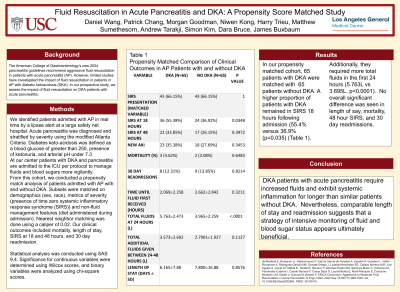Sunday Poster Session
Category: Biliary/Pancreas
P0071 - Fluid Resuscitation in Acute Pancreatitis and DKA: A Propensity Score-Matched Study
Sunday, October 27, 2024
3:30 PM - 7:00 PM ET
Location: Exhibit Hall E

Has Audio

Daniel Wang, MD
Keck School of Medicine of the University of Southern California
Torrance, CA
Presenting Author(s)
Daniel Wang, MD1, Patrick Chang, MD2, Morgan Goodman, MD3, Niwen Kong, MD2, Harry Trieu, MD3, Matt Sumethasorn, MD3, Sean Dewberry, MD3, Simon Kim, BS3, Andrew Tarakji, BS3, Dara Bruce, MSc4, James Buxbaum, MD3
1Keck School of Medicine of the University of Southern California, Torrance, CA; 2University of Southern California, Los Angeles, CA; 3Keck School of Medicine of the University of Southern California, Los Angeles, CA; 4Keck School of Medicine of the University of Southern California, Glendale, CA
Introduction: The American College of Gastroenterology’s new 2024 pancreatitis guidelines recommend aggressive fluid resuscitation in patients with acute pancreatitis (AP). However, limited studies have investigated the impact of fluid resuscitation in patients in AP with diabetic ketoacidosis (DKA). In our prospective study, we assess the impact of fluid resuscitation on DKA patients with acute pancreatitis.
Methods: We identified patients admitted with AP in real time by a lipase alert at a a large safety net hospital.. Acute pancreatitis was diagnosed and stratified by severity using the modified Atlanta Criteria. Diabetes keto-acidosis was defined as a blood glucose of greater than 250, presence of ketonuria, and arterial pH under 7.3
At our center patients with DKA and pancreatitis are admitted to the ICU per protocol to manage fluids and blood sugars more vigilantly.
From this cohort, we conducted a propensity match analysis of patients admitted with AP with and without DKA. Subsets were matched on demographics (sex, race), metrics of severity (presence of time zero systemic inflammatory response syndrome (SIRS)) and non-fluid management features (diet administered during admission). Nearest neighbor matching was done using a caliper of 0.02. Our clinical outcomes included mortality, length of stay, SIRS at 18 and 48 hours, and 30 day readmission.
Statistical analysis was conducted using SAS 9.4. Significance for continuous variables were determined using Wilcox scores, and binary variables were analyzed using chi-square scores.
Results: In our propensity matched cohort, 65 patients with DKA were matched with 65 patients without DKA. A higher proportion of patients with DKA remained in SIRS 18 hours following admission (55.4% versus 36.9% (p=0.035) (Table 1). Additionally, they required more total fluids in the first 24 hours (5.763L vs 3.695L, p< 0.0001). No overall significant difference was seen in length of say, mortality, 48 hour SIRS, and 30 day readmissions.
Discussion: DKA patients with acute pancreatitis require increased fluids and exhibit systemic inflammation for longer than similar patients without DKA. Nevertheless, comparable length of stay and readmission suggests that a strategy of intensive monitoring of fluid and blood sugar status appears ultimately beneficial.
Note: The table for this abstract can be viewed in the ePoster Gallery section of the ACG 2024 ePoster Site or in The American Journal of Gastroenterology's abstract supplement issue, both of which will be available starting October 27, 2024.
Disclosures:
Daniel Wang, MD1, Patrick Chang, MD2, Morgan Goodman, MD3, Niwen Kong, MD2, Harry Trieu, MD3, Matt Sumethasorn, MD3, Sean Dewberry, MD3, Simon Kim, BS3, Andrew Tarakji, BS3, Dara Bruce, MSc4, James Buxbaum, MD3. P0071 - Fluid Resuscitation in Acute Pancreatitis and DKA: A Propensity Score-Matched Study, ACG 2024 Annual Scientific Meeting Abstracts. Philadelphia, PA: American College of Gastroenterology.
1Keck School of Medicine of the University of Southern California, Torrance, CA; 2University of Southern California, Los Angeles, CA; 3Keck School of Medicine of the University of Southern California, Los Angeles, CA; 4Keck School of Medicine of the University of Southern California, Glendale, CA
Introduction: The American College of Gastroenterology’s new 2024 pancreatitis guidelines recommend aggressive fluid resuscitation in patients with acute pancreatitis (AP). However, limited studies have investigated the impact of fluid resuscitation in patients in AP with diabetic ketoacidosis (DKA). In our prospective study, we assess the impact of fluid resuscitation on DKA patients with acute pancreatitis.
Methods: We identified patients admitted with AP in real time by a lipase alert at a a large safety net hospital.. Acute pancreatitis was diagnosed and stratified by severity using the modified Atlanta Criteria. Diabetes keto-acidosis was defined as a blood glucose of greater than 250, presence of ketonuria, and arterial pH under 7.3
At our center patients with DKA and pancreatitis are admitted to the ICU per protocol to manage fluids and blood sugars more vigilantly.
From this cohort, we conducted a propensity match analysis of patients admitted with AP with and without DKA. Subsets were matched on demographics (sex, race), metrics of severity (presence of time zero systemic inflammatory response syndrome (SIRS)) and non-fluid management features (diet administered during admission). Nearest neighbor matching was done using a caliper of 0.02. Our clinical outcomes included mortality, length of stay, SIRS at 18 and 48 hours, and 30 day readmission.
Statistical analysis was conducted using SAS 9.4. Significance for continuous variables were determined using Wilcox scores, and binary variables were analyzed using chi-square scores.
Results: In our propensity matched cohort, 65 patients with DKA were matched with 65 patients without DKA. A higher proportion of patients with DKA remained in SIRS 18 hours following admission (55.4% versus 36.9% (p=0.035) (Table 1). Additionally, they required more total fluids in the first 24 hours (5.763L vs 3.695L, p< 0.0001). No overall significant difference was seen in length of say, mortality, 48 hour SIRS, and 30 day readmissions.
Discussion: DKA patients with acute pancreatitis require increased fluids and exhibit systemic inflammation for longer than similar patients without DKA. Nevertheless, comparable length of stay and readmission suggests that a strategy of intensive monitoring of fluid and blood sugar status appears ultimately beneficial.
Note: The table for this abstract can be viewed in the ePoster Gallery section of the ACG 2024 ePoster Site or in The American Journal of Gastroenterology's abstract supplement issue, both of which will be available starting October 27, 2024.
Disclosures:
Daniel Wang indicated no relevant financial relationships.
Patrick Chang indicated no relevant financial relationships.
Morgan Goodman indicated no relevant financial relationships.
Niwen Kong indicated no relevant financial relationships.
Harry Trieu indicated no relevant financial relationships.
Matt Sumethasorn indicated no relevant financial relationships.
Sean Dewberry indicated no relevant financial relationships.
Simon Kim indicated no relevant financial relationships.
Andrew Tarakji indicated no relevant financial relationships.
Dara Bruce indicated no relevant financial relationships.
James Buxbaum indicated no relevant financial relationships.
Daniel Wang, MD1, Patrick Chang, MD2, Morgan Goodman, MD3, Niwen Kong, MD2, Harry Trieu, MD3, Matt Sumethasorn, MD3, Sean Dewberry, MD3, Simon Kim, BS3, Andrew Tarakji, BS3, Dara Bruce, MSc4, James Buxbaum, MD3. P0071 - Fluid Resuscitation in Acute Pancreatitis and DKA: A Propensity Score-Matched Study, ACG 2024 Annual Scientific Meeting Abstracts. Philadelphia, PA: American College of Gastroenterology.
